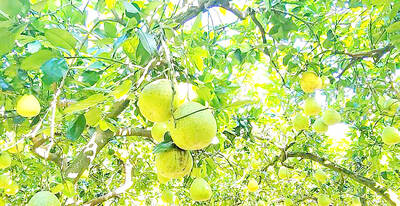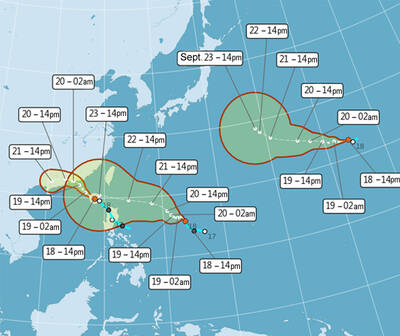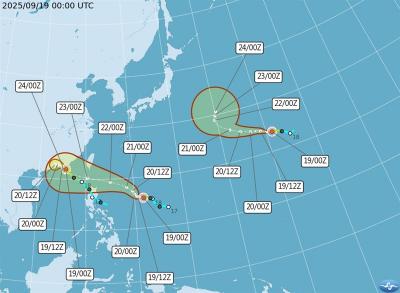Beijing plans to intensify its unification campaign, a Mainland Affairs Council (MAC) official said yesterday in an assessment of statements by Chinese leaders, while stressing the importance of consensus among Taiwanese.
At a conference on Chinese development and security prospects in the Taiwan Strait, MAC Deputy Minister Chiu Chui-cheng (邱垂正) noted key developments in Chinese Communist Party (CCP) rhetoric.
Much attention has been given to the sixth plenum of the CCP Central Committee, which on Nov. 11 issued the party’s third-ever “historical resolution,” paving the way for Chinese President Xi Jinping (習近平) to retain power through next year’s leadership reshuffle, Chiu said.

Photo courtesy of the Mainland Affairs Council
According to Chiu’s assessment, the CPP’s ideological fixation on one leader is bound to limit its economic development.
The resolution gives an ideologically “correct” view of 100 years of party history, omitting past mistakes, he said.
Xi maintains the view that recent Chinese history is defined by two periods — before and after reform, and opening up — neither of which can be denied, Chiu said.
The CCP believes its sovereignty would be shaken if its legitimacy is questioned, requiring the consolidation of social and political ideology around one leader, he said.
Under incessant party intervention, space for economic and private activity would inevitably continue to shrink, he added.
At the same time, the CCP is becoming increasingly aggressive toward other countries, Chiu said.
Its leaders have made clear that their “Chinese dream” is of a strong military, aiming to modernize its armed forces by the party’s centenary in 2027, he said.
Meanwhile, the Chinese military has been unabashedly ramping up activity in the Taiwan Strait and nearby seas, he added.
In terms of diplomacy, it has been equally intractable, flaunting global norms through its “wolf warrior” diplomacy and hypernationalism, he said.
Regarding Taiwan’s response, Chiu stressed that working with like-minded nations is “of the utmost importance.”
As observers have reiterated, democracies must defend their shared values, he said.
As a nation on the front lines of the fight against authoritarianism, “if Taiwan falls, democratic values would fall with it,” he added.
Comments from the CCP leadership also indicate an intensification of unification efforts, Chiu said, citing the party’s vow in its historical resolution to solve the “Taiwan issue” and Xi’s call with US President Joe Biden on Tuesday last week, in which he threatened to take “decisive measures” if any red lines are crossed.
Even in the face of these threats, Taiwanese are united around the consensus represented by the “four commitments” that President Tsai Ing-wen (蔡英文) proposed in her Double Ten National Day speech, Chiu said.
Taiwan does not stand alone, as more nations are voicing their support, he added.
Asked about a claim by the Chinese People’s Political Consultative Conference Daily on Saturday that Taiwanese would each stand to gain NT$20,000 annually from unification, Chiu said the report was unworthy of comment, laughing it off.
Taiwan is a democracy where people have gained freedom, sovereignty and the rule of law through the sacrifice of many, Chiu said.
“These values are just as important as the air, sun and water,” he said, adding that it is absurd that the CCP believes they are only worth NT$20,000.

NEW AGREEMENT: Malaysia approved imports last year after nearly two years of negotiations and inspections to meet quarantine requirements, officials said Up to 3.6 tonnes of pomeloes from Taiwan cleared Malaysian customs on Friday, in the first shipment of Taiwanese pomeloes to Malaysia. Taiwan-grown pomeloes are popular in domestic and overseas markets for their tender and juicy taste, the Ministry of Agriculture’s Animal and Plant Health Inspection Agency said. The fruit is already exported to Japan, Canada, Hong Kong, Singapore and the Philippines, it added. The agency began applying for access to the Malaysian market in 2023, compiling data on climate suitability, pests and diseases, and post-harvest handling, while also engaging in nearly two years of negotiations with Malaysian authorities and submitting supplementary

PEAK MONTHS: Data showed that on average 25 to 27 typhoons formed in the Pacific and South China seas annually, with about four forming per month in July and October One of three tropical depressions in the Pacific strengthened into a typhoon yesterday afternoon, while two others are expected to become typhoons by today, Central Weather Administration (CWA) forecaster Lee Ming-hsiang (李名翔) said yesterday. The outer circulation of Tropical Depression No. 20, now Typhoon Mitag, has brought light rain to Hualien, Taitung and areas in the south, Lee said, adding that as of 2pm yesterday, Mitag was moving west-northwest at 16kph, but is not expected to directly affect Taiwan. It was possible that Tropical Depression No. 21 would become a typhoon as soon as last night, he said. It was moving in a

Tigerair Taiwan and China Airlines (CAL) today announced that several international flights were canceled or rescheduled due to Typhoon Ragasa. The Central Weather Administration (CWA) has maintained sea and land warnings for the typhoon. Its storm circle reached the Hengchun Peninsula (恆春半島) on Taiwan's southern tip at 11am today. Tigerair Taiwan said it canceled Monday's IT551/IT552 Taoyuan-Da Nang, IT606/IT607 Taoyuan-Busan and IT602 Taoyuan-Seoul Incheon flights. Tomorrow, cancelations include IT603 Seoul Incheon-Taoyuan, as well as flights between Taoyuan and Sapporo, Osaka, Tokyo Narita, Okinawa, Fukuoka, Saga, Tokyo Haneda, Nagoya, Asahikawa and Jeju. On Wednesday, the IT321/IT322 Kaohsiung-Macau round-trip would also be canceled. CAL announced that today's

Three tropical depressions yesterday intensified into tropical storms, with one likely to affect Taiwan as a typhoon, the Central Weather Administration (CWA) said. The three storms, named Mitag, Ragasa and Neoguri, were designated as storms No. 17 to 19 for this year, the CWA said. Projected routes indicate that Ragasa is most likely to affect Taiwan, it said. As of 2am today, Ragasa was 1,370km east-southeast of Oluanpi (鵝鑾鼻) on the southernmost tip of Taiwan. It was moving west-northwest before turning northwest, slowing from 11kph to 6kph, the agency said. A sea warning for Ragasa is unlikely before Sunday afternoon, but its outer rim